On Monday a meeting in First Selection Fred Camillo’s officer with a workshop format, included a presentation on the Pay As You Throw (PAYT), a proposal included in Mr. Camillo’s budget.
The item is also on the Wednesday, Feb 12 Board of Selectmen agenda.
The program would begin Oct 1, 2020.
Blaize Levitan, a Senior Management Analyst for the Town, presented a slide show. With PAYT, residents and businesses would purchase special bags from retailers for their trash.
“It doesn’t require capital investment or for haulers to change equipment or operations,” Levitan said. “We can just flip a switch and start using the bags to collect the waste. ”
The price of the bags – $2.00 for 33 gallon and $1.25 for 13 gallons – is based on the tip fees the town pays to bring Municipal Solid Waste from Holly Hill to an incinerator.
Currently residents and haulers pay no tipping fees.
If approved, PAYT would have a grace period for fines from Oct 1 to Jan 1, 2021. After Jan 1, 2021 fines would be $100 for first violation, $250 for second, and $1,000 thereafter.
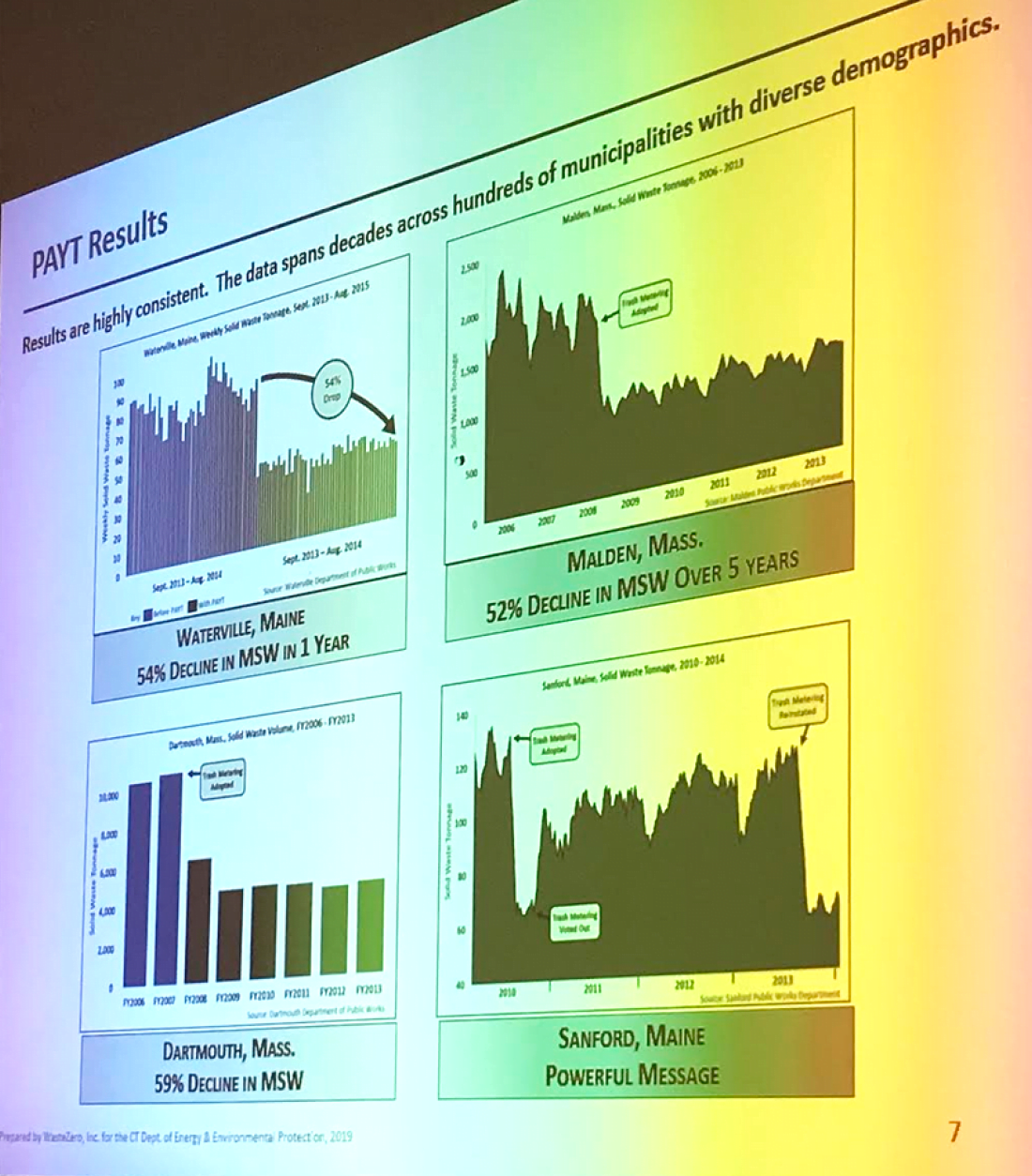
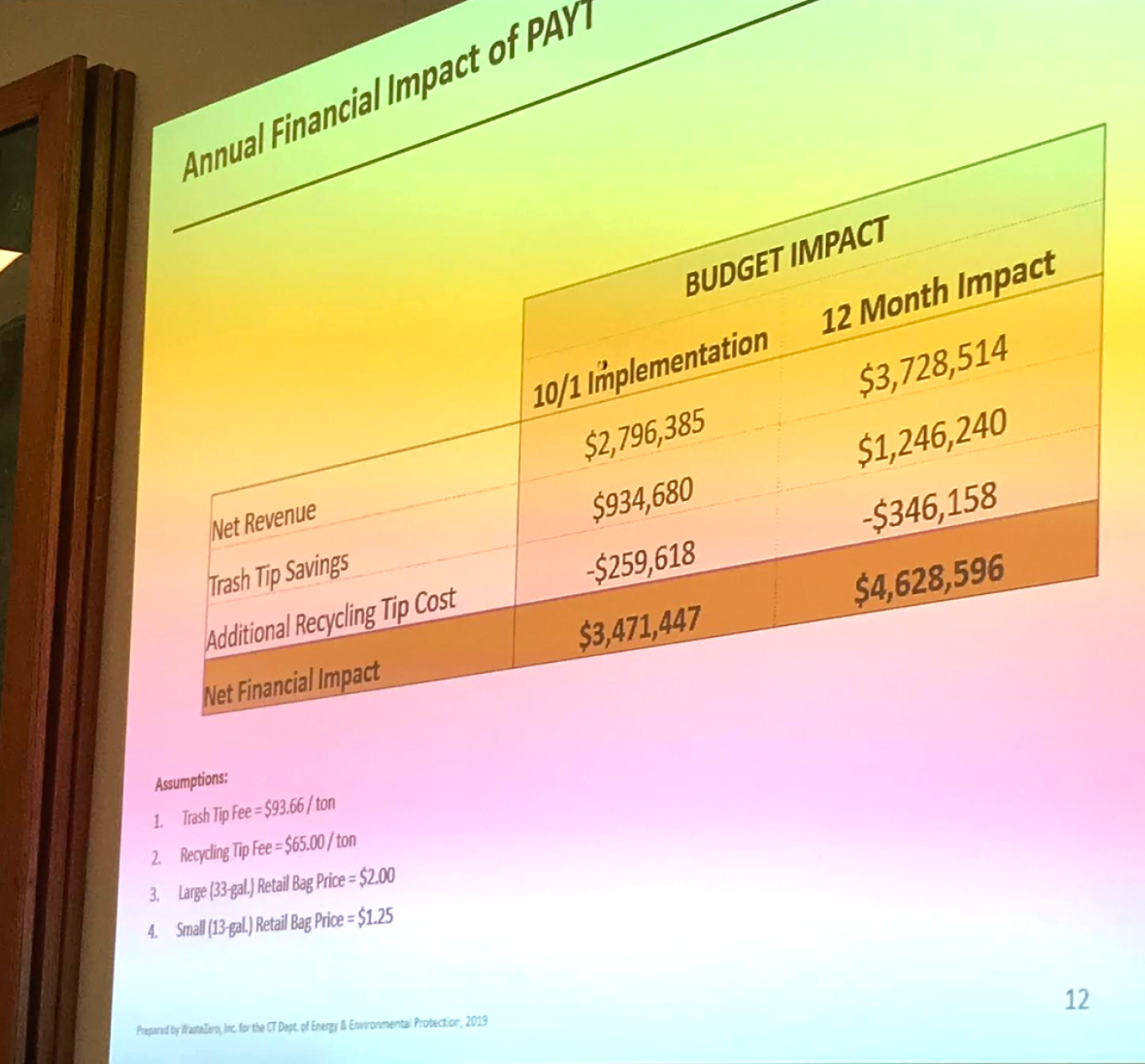
WasteZero Inc
The proposal includes hiring WasteZero Inc, a company recommended by DEEP.
In fact many of the slides in Mr. Levitan’s presentation were prepared by WasteZero.
Mr. Levitan said WasteZero would be paid to handle customer service, bag distribution and enforcement for a short period of time. After that, the town could put out a bid just for bags.
“They’re the main game in town,” Levitan said of WasteZero. “They they help in advance with education and post cards to all the residents, and do the on site piece on the floor and have someone who can ride along with haulers.’
Levitan said WasteZero would initially conduct the education piece and carry out enforcement at the station.
According to the presentation, the incremental impact to a resident with a property assessed at $1 million, who switches from buying trash bags to PAYT bags, would be $105 a year.
Also, with all else constant in the proposed budget from the First Selectman, Levitan claimed the mill rate would increase 2.53% increase with PAYT versus 3.42% without.
Both recycling and MSW disposal costs are rising steeply, though there is still some market for recycling. It costs $65 a ton to remove recycling, versus $93 a ton for trash removal.
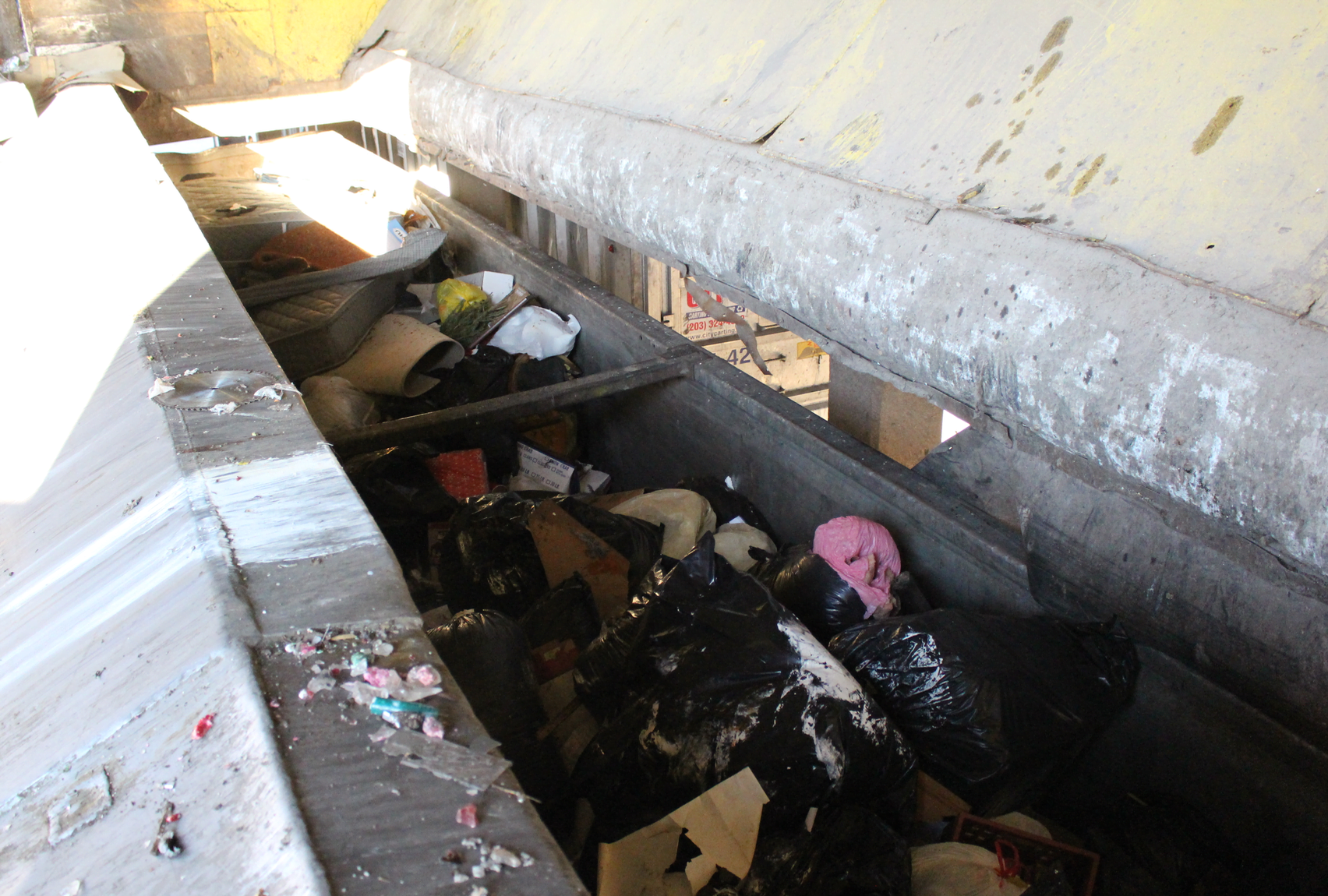
Inside the trash room municipal solid waste goes into compartments that then are loaded into trucks to be taken away. Contributed photo
Though Greenwich’s trash does not go to Hartford’s Materials Innovation and Recycling Authority “MIRA” a trash-to-energy facility, the state is looking at $300 million to build a new incinerator if waste is not reduced statewide.
Towns are being challenged by DEEP to reduce municipal solid waste by 60% by 2024.
“You can get a 40% reduction just by doing PAYT,” Levitan said.
Levitan said with PAYT the estimate is for a reduction of 13,000 tons of waste in first year for a savings of almost $1 million.

Food scrap recycling is being done in nearby towns. contributed photo
Food Scrap Recycling
The town is piloting a food scrap recycling program beginning in April, with the goal of diverting food, which is heavy, from trash.
There was discussion of unintended consequences of a successful food scrap recycling pilot.
DPW commissioner Amy Siebert said the food scrap recycling was just a pilot program for now, but if successful she said the town might wind up offering additional drop off spots. She said she hoped it would also inspire residents to compost in their yards.
Residents who start to bring food scraps to Holly Hill might start to bring their trash too, bypassing hired haulers altogether.
Camillo said he didn’t want to see increase traffic through Chickahominy to Holly Hill.
“We don’t want to exacerbate lines at Holly Hill,” DPW commissioner Siebert agreed.
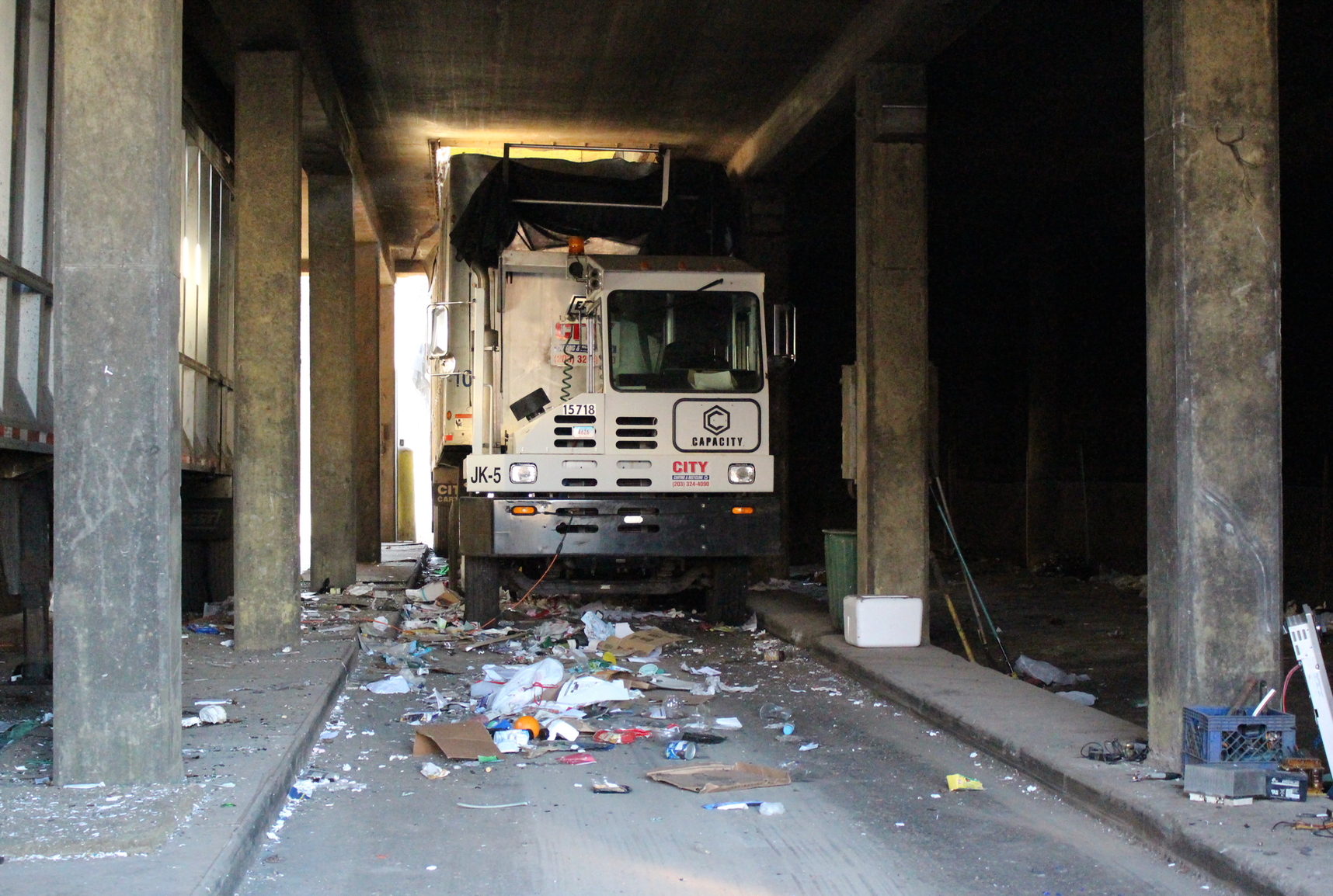
A City Carting truck waits to be loaded with municipal solid waste to take out of town. contributed photo
Tipping Fees Instead?
One slide refuted the notion that PAYT was regressive. At that point Selectperson Jill Oberlander asked whether instituting tipping fees might be an alternative to PAYT.
Greenwich is one of the only municipalities in the state not to have tipping fees, if not the only one.
She asked whether communities that have instituted PAYT had underlying tipping fees. Mr. Levitan said he would look into that.
Greenwich is rare in that the town pays tipping fees, but residents and haulers do not.
Residents with a car registered Greenwich can take their trash to Holly Hill and dump it for no fee.
Oberlander said the environmental goals of PAYT were laudable, but that all things weren’t equal in comparisons with other towns.
“Where are they starting?” she asked. “If they have a tipping fee I’d like to know the reduction in trash pre- and post- tip fee.”
“Did you consider an annual permit fee to Holly Hill?” she asked.
Branyan said a flat fee might work as an alternative.
But, Levitan said, “When you’re a good recycler, you’re forced to subsidize people who aren’t recycling. PAYT gives people ability to control heir own expenses, which they currently can’t.”
Oberlander asked if a tipping fee was instituted for households, in which MSW was weighed, might it have the same incentive as PAYT, and at the same time eliminate the extra plastic bags.
“Most places don’t have the capacity to put every single car over the scale,” Siebert replied.
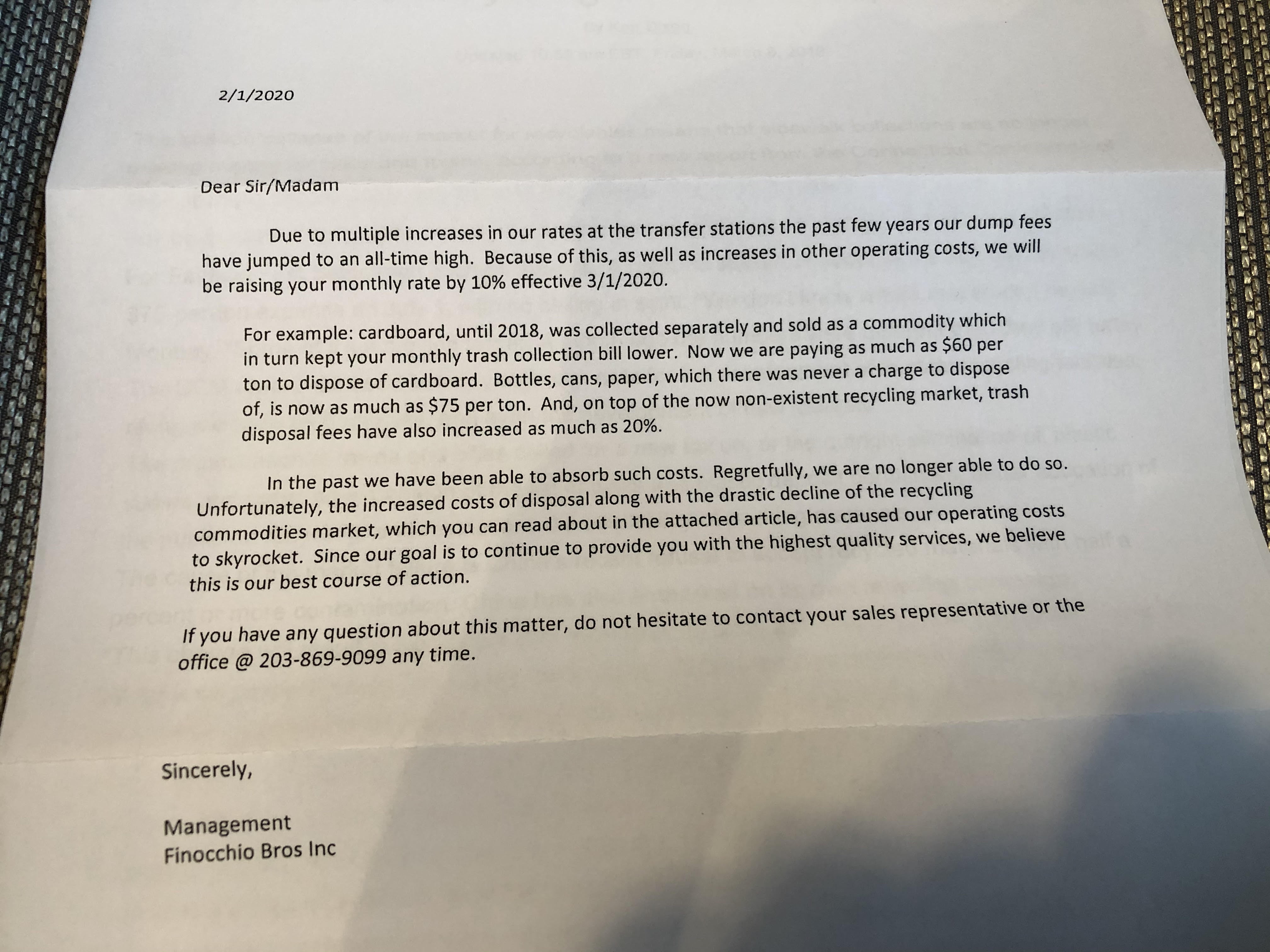
One hauler recently sent a letter to customers announcing a 10% rate increase, citing “increased dump fees.”
Camillo said the letter was misleading because there are no tipping fees.
Rates charged by haulers to Greenwich households range from about $30 to $50 a month.
Camillo, formerly a hauler himself, said PAYT would not impact the 26 independent haulers in town.
If, for example, the average household pays $40 a month for a hauler’s services, times 12 months, times 22,000 households, before costs of trucks and gas, haulers bring in about $10,500,000, or $403,846 each annually.
Siebert said residents can pick and choose from the 26 haulers in town to get the best price, though not all residents have found that to be the case.
And not all haulers will cancel service immediately, but rather at the end of a three- or six- month cycle.
Camillo said if a hauler sells their route they pass on the “goodwill” from customers.
In Greenwich, many residents look for cost savings anywhere they can find them, and are adverse to new fees or taxes.
If the pushback against the initial proposal for a 10¢ fee on plastic bags (the town went with a ban without a fee instead) is a barometer, residents might balk at PAYT.
Similarly, if the backlash against proposed highway tolls is analogous, residents might also balk at a $1.25 or $2.00 per bag fee.
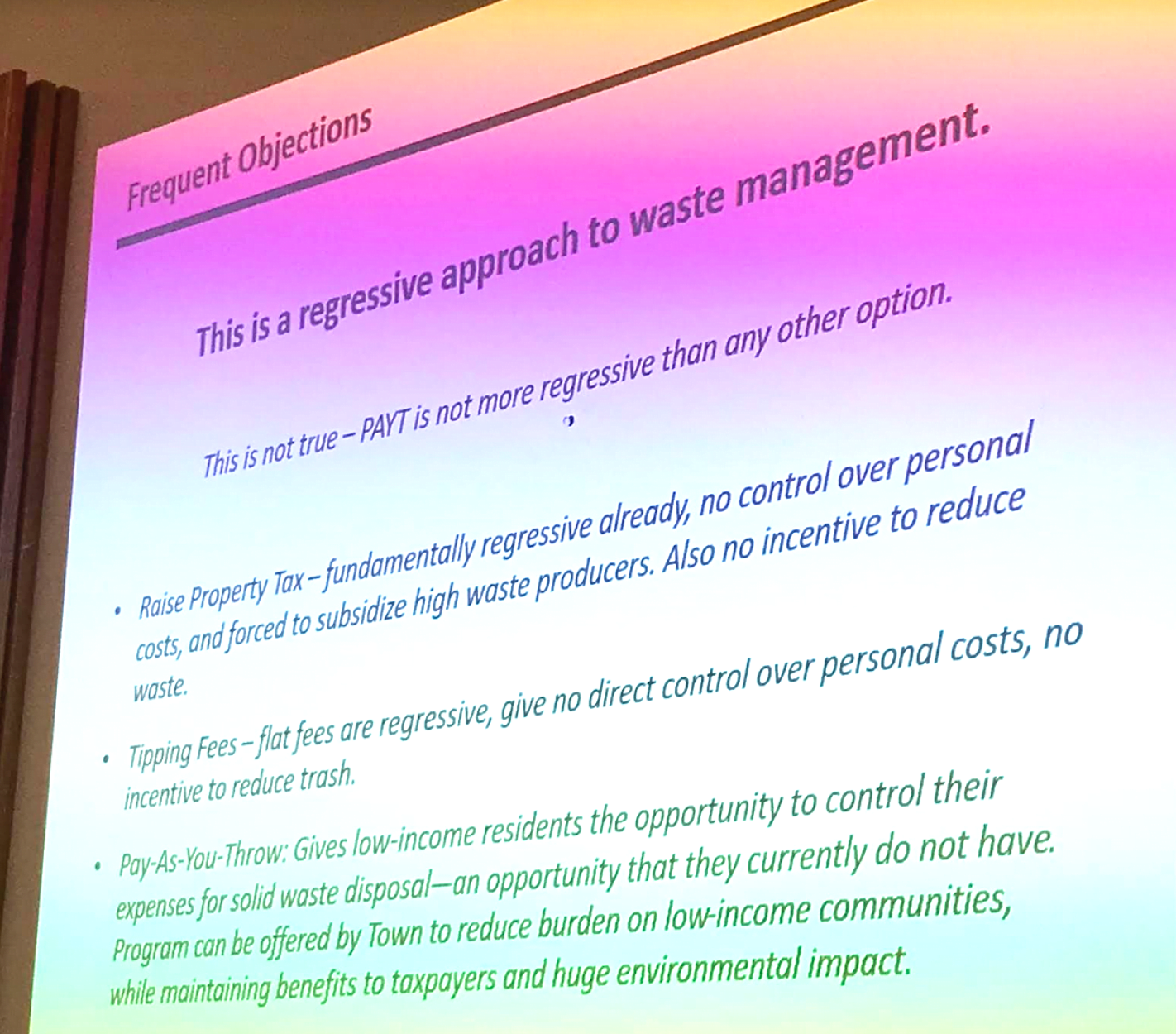
Frequent Objections: Regressive Approach to Waste Management? What about Low Income Households?
A slide refuted a frequent objections that PAYT is a regressive approach.
“I don’t know if I would agree with that or not,” Oberlander said.
A second frequent objection, that property taxes are fundamentally regressive, also hit a nerve.
“I’m not so sure I agree with that,” Oberlander said.
Camillo disagreed.
“I think this (the claim on the slide) holds up,” Camillo said.
There was much discussion on whether PAYT was regressive and its impact on people in poverty, particularly tenants in Housing Authority properties.
Mr. Branyan said he had a meeting scheduled with Terry Mardula of the Housing Authority later in the week.
Levitan characterized tipping fees generally as regressive because in towns that have them, residents typically pay a flat fee in the area of $5.00 per trip.
“PAYT is no more regressive than any other option,” Levitan said.
“PAYT is less regressive,” Camillo said.
“Programs can be offered to reduce the burden on low income residents,” Levitan said.
“Is waste removal incorporated into the (HATG) rental payment or is it added on as a fee?” Oberlander asked. “If they’re not paying for waste removal, this is an additional cost, unless they are being provided the bags,” Oberlander said.
“I don’t think waste removal costs are being passed along,” Camillo said.
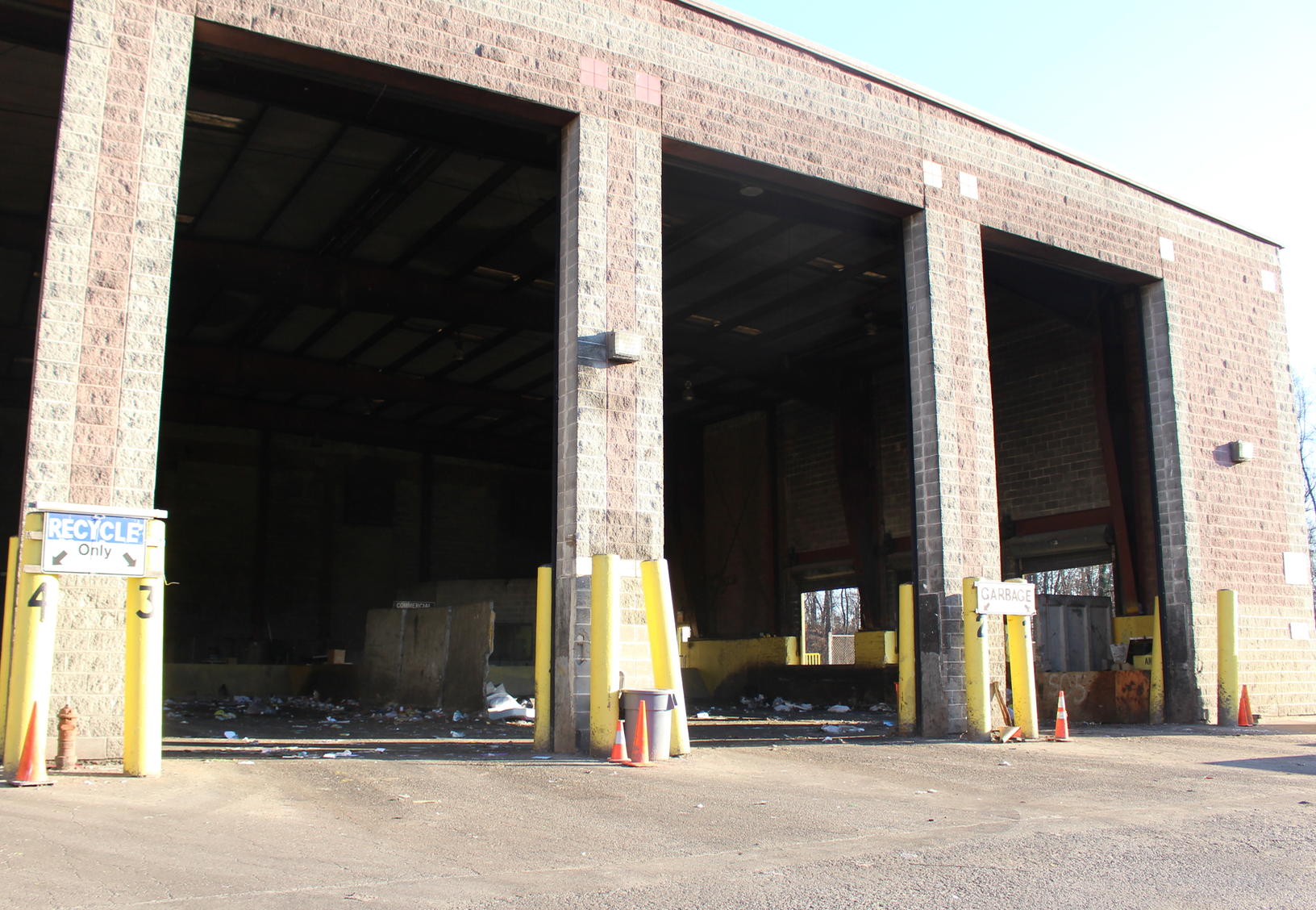
Trash facility at Holly Hill. Contributed photo
Town Administrator Ben Branyan said he had conversations with Alan Barry of Dept of Human Services about assistance to households that might find PAYT a financial barrier.
He said there might be grants available from DEEP.
There was discussion that Greenwich could exempt ALICE households (Asset Limited, Income Constrained, Employee households) from the PAYT bag fees.
According to the United Way about 4,600 of Greenwich’s 22,000 households, are ALICE households, which is about 25% of Greenwich households.
There was discussion about leaving low income families out of the spirit of the program, which is to incentivize behavior to reduce trash.
“I agree, you are ripping the incentives away,” Camillo said of low income residents who likely won’t be required to purchase PAYT bags.
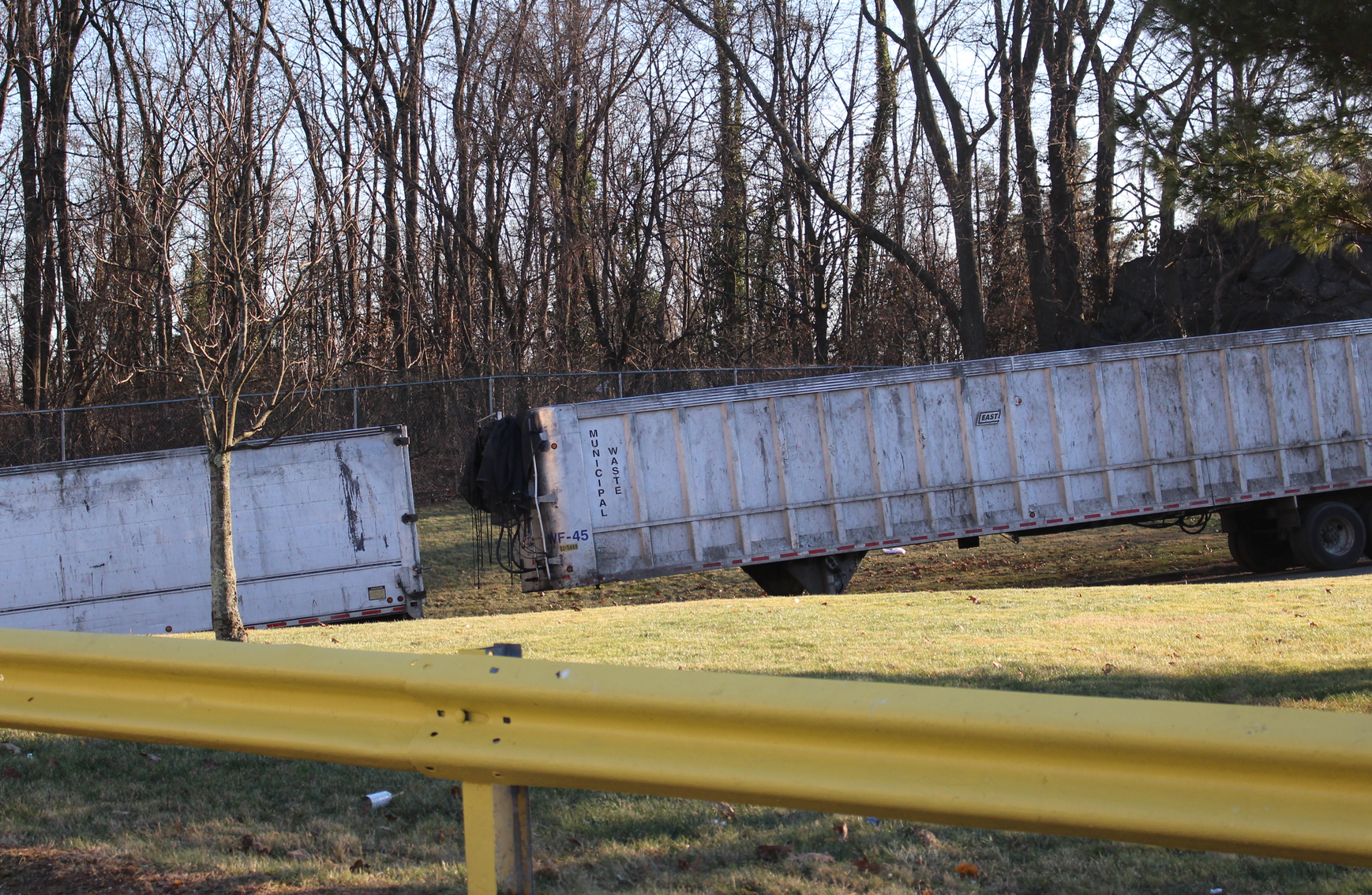
Truck containers marked Municipal Waste at Holly Hill. Contributed photo
Plastic Bag Inside a Plastic Bag
Oberlander said in her family for example, they take the trash out daily.
She asked how PAYT would impact families who take out their trash every night, even if it’s not full.
“If you don’t have AC and it’s really hot. Maybe it’s skunky. You can still put it in one PAYT bag even if you’ve wrapped it up to get it out of your kitchen. It’s really easy,” said Siebert.
She said families can line their outdoor garbage can with a big PAYT bag and fill it over the course of a week with smaller bags of trash.
Implementing PAYT in Businesses, Public Buildings
Ms. Oberlander said much more work needs to be done on PAYT, including outreach to businesses.
Restaurants for example, create multiple bags of trash daily.
Mr. Branyan said business owners typically change behaviors once they realize there is a cost associated with their behavior, specifically referencing food scrap recycling.
Levitan said most communities that have implemented PAYT have found that within 6 weeks there was compliance.
“Illegal dumping and concerns that come along with this program – if it was problems before PAYT it will still be, and if there wasn’t, it didn’t change. We had that concern.”
Levitan said the town had contacted other towns to ask about enforcement and heard it hadn’t been an issue.
Oberlander asked if Town buildings and schools would be required to use the PAYT bags.
Branyan said all tax payer funded organizations, including Greenwich Public Schools, would use the special bags, but pay the gross cost of roughly 31¢ rather than the full retail price of $2.00 for a 33 gallon bag.
There were questions about PAYT in places like town parks or on Greenwich Avenue where trash is not currently bagged.
DPW Commissioner Siebert said it might not make sense to use PAYT bags along Greenwich Avenue, for example.
“The only route we wouldn’t anticipated bagged would be along Greenwich Ave,” she said.
Enforcement will occur at Holly Hill rather than by haulers. There is a person stationed on the tipping floor who for example checks addresses on envelopes for residency.
Elizabeth Dempsey asked if there was a concern that recycling might become contaminated if residents try to keep more out of their trash.
“People start to make choices if they can,” Siebert said. “Many of us have the bags you can bring to put your vegetables in instead of the clam shell (plastic).”
Jill Oberlander asked Branyan if he’d reached out to the Commission on Aging. Branyan said they would do that.
Oberlander asked what West Hartford and Fairfield have for waste generation, disposal costs and tipping fees. Greenwich is frequently compared to those two towns, which have roughly the same population as Greenwich. Neither of those communities have PAYT. They have town provided curbside collection rather than private haulers.
PAYT is on the agenda for the Board of Selectmen meeting on Feb 12.
…to be continued.